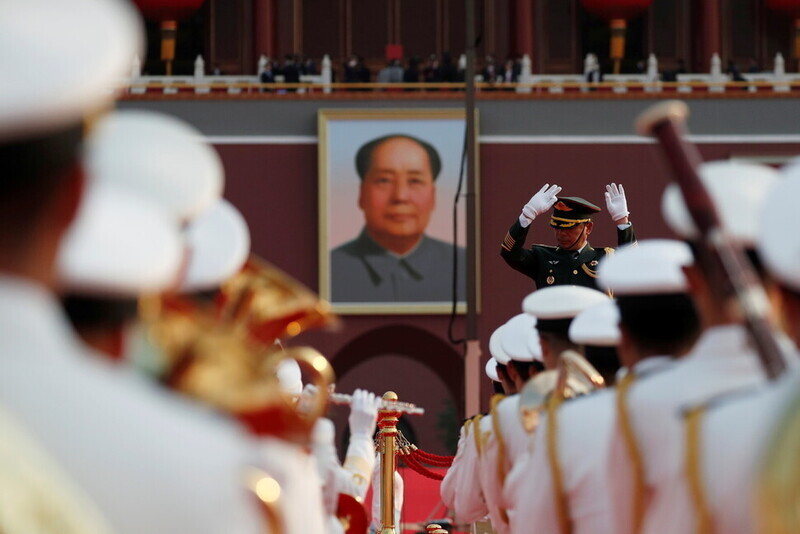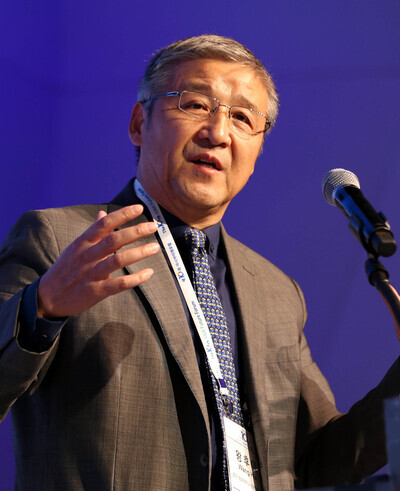hankyoreh
Links to other country sites 다른 나라 사이트 링크
[Column] The trouble with Wang Hui’s pan-Asianism


In an interview on a Russian state TV channel in April, international arms dealer Viktor Bout told a reporter he had sent a telegram to Trump urging him to flee to Russia for safety, saying that it was in the best interests of humanity to protect the former US president “so that he leads this uprising against the globalists.”
Absurd as it may sound, this proposal of a direct alliance between today’s Russia and Trumpian populism renders perfectly the underlying ideological project of Russia: that of a new multipolar world in which even the people of the states which dominate in today’s global order will be liberated. When Putin says America has “nothing to offer the world except domination,” he is attacking America as a global power which at the same time exploits the majority of the American people (for whom Trump speaks).
However, China cannot be said to advocate the Russian version of the new world order. For over a century, China has been following another project: pan-Asianism.
Pan-Asianism emerged toward the end of the 19th century as a reaction to Western imperialist domination and exploitation. From the very beginning, it was a complex project of economic and political emancipation based on the rejection of Western liberal individualism. It came in many shades, but its main ingredients were anti(-Western)-imperialism and the ideal that Asia does not have to follow the Western way of progress — i.e., that it can appropriate its premodern traditions to organize its own industrial modernization in a way that will be even more dynamic than that of the West.
Pan-Asianism oscillated between its socialist and fascist version — with the two often not even clearly divided. We should not forget that “anti-imperialism” is not as innocent a motto as it may appear; both the Japanese and the German fascists regularly used this motto, presenting themselves as defenders against American, British and French imperialism.
Today, the main promoter of a communist pan-Asianism is Wang Hui, a Chinese thinker who, while faithful to Maoist legacy, in matters economic remains a social democrat. Wang insists that what we are witnessing today is not the consequence of the market economy as such but of its distortion. “Resistance against monopolization and domineering market tyranny cannot be simply equaled with the struggle ‘against’ the market, because such social resistance itself includes the efforts striving for fair competition in the market and for economic democracy,” says Wang.
“The struggle for social justice and fair market competition cannot be equaled with the opposition to state intervention. It rather requires socialist democracy, namely, to prevent the state from becoming the protector of domestic monopoly and multinational monopoly through the society’s democratic control of the state,” he writes.

Xi Jinping says his new round of reforms is targeted much more at the new big corporate monopolies, but can one seriously claim that we have “society’s democratic control of the state” in the China of today? We can on one condition: that we posit equality between “society” and “the Communist Party.” The party controls the state on behalf of the people, but what we certainly do not see is society’s democratic control of the party.
Wang Hui advocates social democracy, with the additional claim that if social democracy is grounded in Asian civilizational traditions, it renders it possible to avoid the Western type of multi-party democracy and enact a social order with much stronger people’s participation. Along these lines, he rejects the claim that Mao Zedong and Deng Xiaoping are to be opposed as excluding each other, and that Xi simply stands for a (limited) return to the Maoist hard line: They are all part of a continuous emancipatory process which began with Sun Yat Sen and reaches up to Chinese intervention into Korean War and recent attempts to unite with Taiwan. The narrow Western view misses this key point, seeing in this process only a struggle between “Western liberal democracy” and Communist “totalitarianism.”
Wang tends to think of Europe as a domain of nation states, and China as a unique multicultural civilization. But we perceive today in China a tendency toward a strong united nation state with a tight control of minorities, extolling “patriotism” as the supreme value. Today’s European Union is much more multicultural, with growing regionalism and minorities demanding more autonomy, such as in Scotland, Wales, Basque Country, and Catalonia.
Another pan-Asian leftist argument is that in Europe and the US, capital reigns directly, with the state apparatus mostly just serving it, while in China the movement of capital is subordinated to state control and regulation. But with regard to socio-economic rights, Europe is still far more socially democratic than China.
Wang and other pan-Asianists on the left refer to what they call “people’s wars” as something that characterizes specifically Asian emancipatory movements. These are military operations that reach beyond the state army and involve large strata of civil population like farmers and workers. The examples they mention are the Chinese Revolution, the Vietnam War, and the Korean War, among others.
But when China sent “volunteers” to help North Korea (after the US intervened on behalf of the UN to enable the South to survive), these “volunteers” were simply regular army units. However, does the term “people’s war” not fit perfectly what goes on in Ukraine, where the state’s military activities are combined with local initiatives, self-organization and forms of improvisation?
China and Russia are hypocritical in their own way, their proclaimed respect for national differences is fake, it clearly prefers particular socio-political options around the world (mostly authoritarian ones). When Putin claims that also the Islamic states and the monarchies of the Persian Gulf have the right to choose their way of life, he ignores the inner antagonisms, tensions and struggles in these countries.
As the case of protests in Iran demonstrates, these inner antagonisms open up the space for another universalism opposed to the imperialist universalism: the universalism of the struggle for emancipation, of the global solidarity of all those oppressed. It is not enough just to express sympathy or solidarity with Iranian protesters. They are not out there, far from us, part of a different exotic culture. All the babble about cultural specificities is now meaningless: We can immediately see that the Iranian struggle is the struggle of us all.
Please direct questions or comments to [english@hani.co.kr]

Editorial・opinion
![[Column] Season 2 of special prosecutor probe may be coming to Korea soon [Column] Season 2 of special prosecutor probe may be coming to Korea soon](https://flexible.img.hani.co.kr/flexible/normal/500/300/imgdb/original/2024/0426/3317141030699447.jpg) [Column] Season 2 of special prosecutor probe may be coming to Korea soon
[Column] Season 2 of special prosecutor probe may be coming to Korea soon![[Column] Park Geun-hye déjà vu in Yoon Suk-yeol [Column] Park Geun-hye déjà vu in Yoon Suk-yeol](https://flexible.img.hani.co.kr/flexible/normal/500/300/imgdb/original/2024/0424/651713945113788.jpg) [Column] Park Geun-hye déjà vu in Yoon Suk-yeol
[Column] Park Geun-hye déjà vu in Yoon Suk-yeol- [Editorial] New weight of N. Korea’s nuclear threats makes dialogue all the more urgent
- [Guest essay] The real reason Korea’s new right wants to dub Rhee a founding father
- [Column] ‘Choson’: Is it time we start referring to N. Korea in its own terms?
- [Editorial] Japan’s rewriting of history with Korea has gone too far
- [Column] The president’s questionable capacity for dialogue
- [Column] Are chaebol firms just pizza pies for families to divvy up as they please?
- [Column] Has Korea, too, crossed the Rubicon on China?
- [Correspondent’s column] In Japan’s alliance with US, echoes of its past alliances with UK
Most viewed articles
- 1Division commander ordered troops to enter raging flood waters before Marine died, survivor says
- 2‘We must say no’: Seoul defense chief on Korean, USFK involvement in hypothetical Taiwan crisis
- 3Is N. Korea threatening to test nukes in response to possible new US-led sanctions body?
- 4No good, very bad game for Korea puts it out of Olympics for first time since 1988
- 5Korea’s 1.3% growth in Q1 signals ‘textbook’ return to growth, says government
- 6US overtakes China as Korea’s top export market, prompting trade sanction jitters
- 7[Column] Has Korea, too, crossed the Rubicon on China?
- 8[Column] ‘Choson’: Is it time we start referring to N. Korea in its own terms?
- 9Will NewJeans end up collateral damage in internal feud at K-pop juggernaut Hybe?
- 10Samsung subcontractor worker commits suicide from work stress